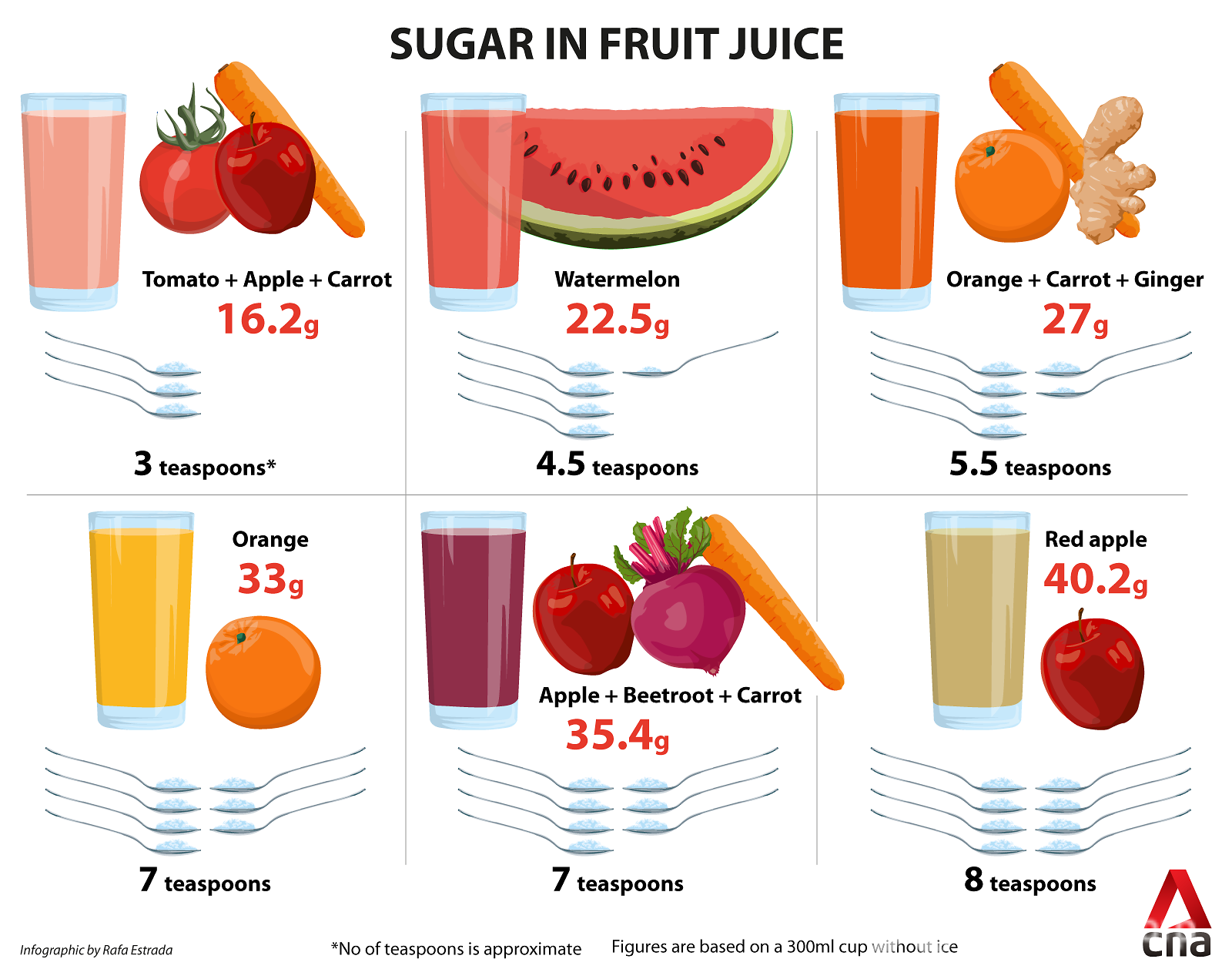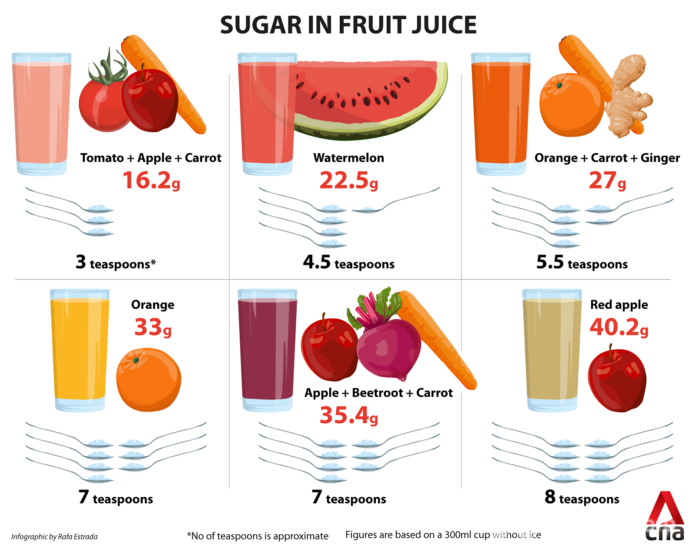SINGAPORE: Watching the fruit juice vendor prepare that cup of apple juice leaves many in no doubt that it is full of nutritious goodness. Indeed, many in Singapore are turning to drinking fruit juices as a healthier alternative to soft drinks.
But tests CNA conducted with the help of experts at Temasek Polytechnic showed that juices are not necessarily the healthier choice. Whether fresh, cold-pressed or pre-packaged, they could contain as much if not more sugar than a can of soft drink. The tests showed that there is more sugar in a 300 ml cup of freshly prepared red apple juice compared to a 320 ml can of soft drink.
Lecturer from the School of Applied Science at Temasek Polytechnic Guo Ren designed and supervised the experiment done by two Year 2 students from the Applied Food Science and Nutrition course to quantify the amount of sugars present in freshly made fruit juices.
The juices of red apple, watermelon and orange as well as popular combinations of apple, beetroot and carrot, popular known as ABC; tomato, watermelon and lemon, as well as orange and ginger, were extracted into a 300ml cup with no ice added.
The amount of sugar, which includes naturally occurring ones, were measured with a refractometer for the experiment. These were the results.

DIFFERENCE BETWEEN EATING FRUIT AND DRINKING FRUIT JUICE
Dr Kalpana Bhaskaran, who heads the Centre for Applied Nutrition Services, said that nutritionally it is better to eat the actual fruit instead of drinking its juice, even if freshly prepared. This for reasons of quantity and quality.
She said the juicing process would strip away dietary fibres. Some of the vitamins and minerals present in whole fruits would also be lost.
And since more than one fruit would typically be needed to make a glass of juice, the amount of sugar in the juice will also be higher compared to eating a single fruit.
Dr Kalpana, who is also the vice-president of Diabetes Singapore, cautioned that people should be mindful of the amount of carbohydrates and sugar they are consuming,.
“We should not forget that fruit juices are a concentrated source of sugar. People are better off eating the fruit,” she said. That way, people won’t lose the fibre, they can control the calorie intake and can feel more full from chewing on the fruit.
Using a medium-sized red apple weighing 130g as an example, Dr Kalpana said eating it provides 15g of carbohydrates, mostly from naturally occurring sugars such as fructose, sucrose, and glucose. But based on the experiment, 40.2g of sugar could be consumed when drinking a 300ml cup of apple juice.
In fact, stripping the fibre off the fruits through the juicing process is not just bad for the bowels. The Health Promotion Board (HPB) said that fibre in fruits helps to slow the absorption of sugars into the bloodstream.
“Without the fibre, the large amount of sugar from fruit juices enters the bloodstream quickly and causes a sugar spike, similar to what happens when we drink sweetened drinks like sodas,” a spokesperson said.
Over time, this wears out the pancreas, which produces insulin, and can lead to weight gain and diabetes, she added.
“Many people may think that naturally occurring sugar is healthier than added sugar, but there is no chemical difference between the two, and they have the same impact on blood sugar level when ingested,” the HPB spokesperson said.
For this reason, HPB said that consuming fresh fruit juices is no different from drinking pre-packaged juices.
Making it worse, some shops add sugar to their freshly-prepared fruit juices, Dr Kalpana said. Sugar could go unnoticed, as it is dissolved in the water that is added. In fact, one of the shops CNA visited admitted to adding sugar to their fruit juices, as the drink would be “tasteless” otherwise.
IS COLD-PRESSED JUICE BETTER?
Cold-pressed juices have been gaining in popularity for being a “better option”. A special juicer is used to slowly pulverise the fruit to extract the juice while preserving as much of the nutrients as possible.
But HPB said when it comes to sugar content, they are no different from juices extracted through a normal juicer.
“As the pulp is left behind, it still loses the beneficial fibres that slows sugar absorption, improves digestive health and helps one feel fuller. Hence, cold-pressed juices have the same effect as conventionally extracted juices on blood sugar levels, weight gain and diabetes,” a spokesperson explained.
HPB also cited data from market research company Mintel to show that pre-packaged “100 per cent” fruit juice without added sugar had a similar amount of sugar to other juice drinks that do not have such labels.
The board recommended that consumers choose whole fruits over fruit juice and to limit fruit juices to no more than one glass a day. This is aligned to the World Health Organisation’s recommendations to limit the intake of sugar, the spokesperson added.
“To maintain a healthy weight and prevent diabetes, we should limit our intake of all types of sugars – both naturally occurring and added,” she said.
Dr Kalpana acknowledged that being out on a sunny day could leave one craving with the feel of a cold fruit juice hitting the throat.
“They can get a small portion, with ice, and specify for it to be made without sugar,” she said.





